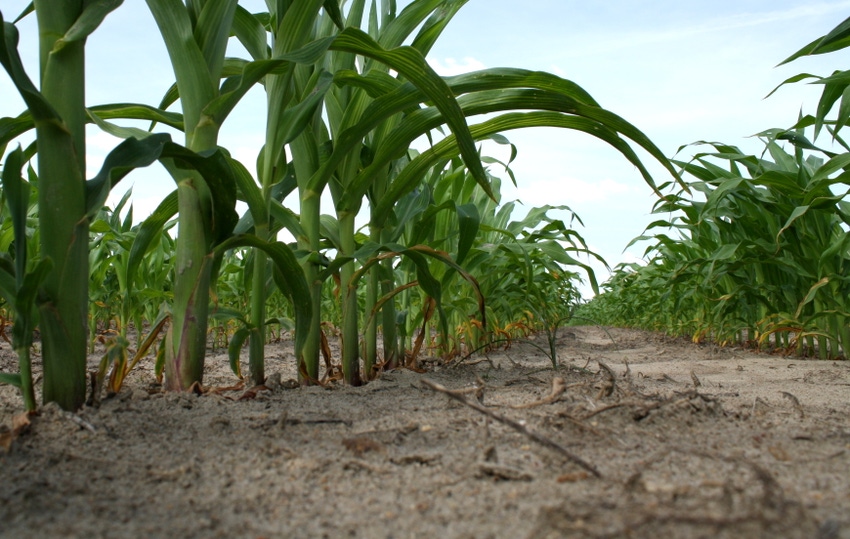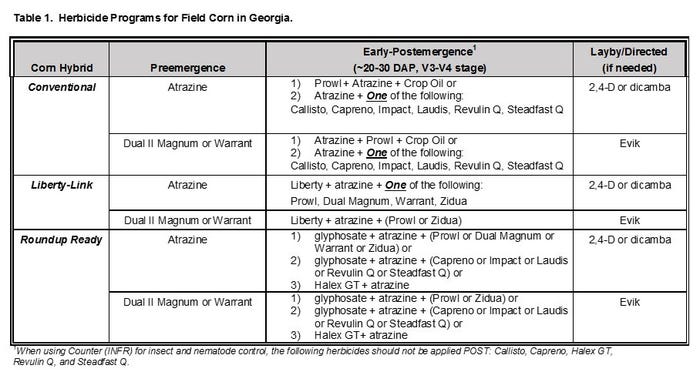February 7, 2018

Not long ago, I watched an older interview of Georgia Bulldog legend Hershel Walker, who calmly stated that a football “ain’t that heavy” after carrying it 40-plus times during a game. The same might be said about field corn weed control programs. They ain’t that heavy either.
Although the Southeast is not normally renowned for its production of field corn, growers in this region planted approximately 1.485 million acres in 2017. Field corn is an outstanding rotational crop for cotton, peanut and soybean systems, but commodity prices often dictate how much corn will be planted in this region.
There are numerous herbicides to choose from and all tend to work satisfactorily as long as the modern weed science mantra of starting clean, using residual herbicides, and making timely POST applications is followed.
I am very hopeful that you began thinking about your field corn weed management programs long before reading this article. But just in case, here are a few questions to ask yourself before spraying and praying:
What kind of herbicide-resistance issues do I have? None, glyphosate, ALS, atrazine, all tthree, any others?
What herbicide systems do I need? Conventional, Roundup-Ready, Liberty-Link, Enlist (2,4-D tolerant)? Enlist corn systems are not likely to be a big player in our region in 2018 but who knows about the future.
Do I need a soil insecticide for nematodes and other early-season insect problems? If you are using Counter (in-furrow) for nematode/insect control, you cannot use POST herbicides such as Acuron, Callisto, Capreno, Halex GT, Revulin Q, and Steadfast Q.
What crops will follow my field corn? Vegetables, double-cropped soybeans, wheat, others? Review herbicide labels for rotational crop restrictions BEFORE applying any product!!!!!!
When should I apply my POST herbicides? If I were King for a day, I would decree that every field corn grower has to be finished spraying his/her POST herbicides before the V5 stage of growth (Dilly, Dilly). Later applications could result in reduced control due to coverage issues and/or potentially cause unnecessary crop injury.
Is annual morningglory driving me crazy? If you are unwilling to consider using a lay-by or post-directed applicator in field corn, late-season annual morningglory control may prove difficult. My herbicide preference in this case would be Evik.
Have Palmer amaranth and/or tropical spiderwort populations developed after corn harvest? Once the combine leaves the field, it is a great time of the year to work on reducing the seed-bank of both of these troublesome weed species via mowing and/or tillage and/or herbicides.
There are plenty of herbicides that can be used in field corn. To make it a little easier, I have provided a list of various herbicides programs for weed control in field corn grown in Georgia based upon how some of the above questions might be answered (Table 1).
If you are a field corn grower from another state, I would strongly encourage you to get your recommendations from the appropriate state extension weed specialist. My magic only works in Georgia.
Field corn growers are fortunate to have numerous tools in their weed management toolbox and they ain’t that heavy. With careful planning, most field corn weed problems can be managed.
As always, good weed hunting!

About the Author(s)
You May Also Like






